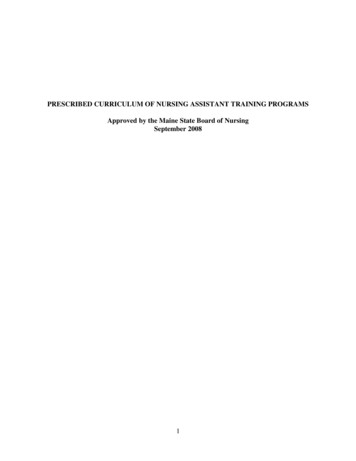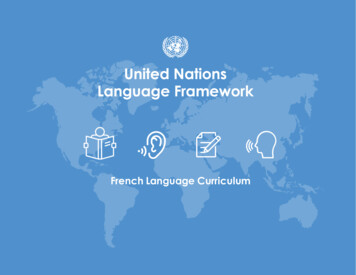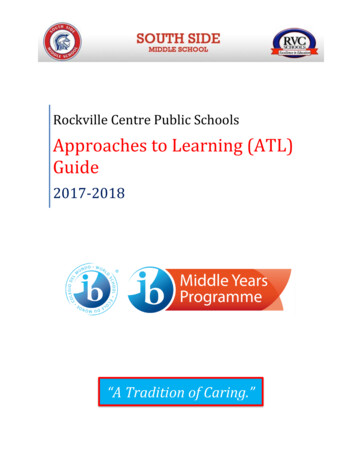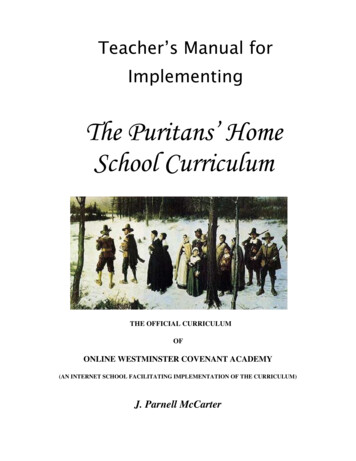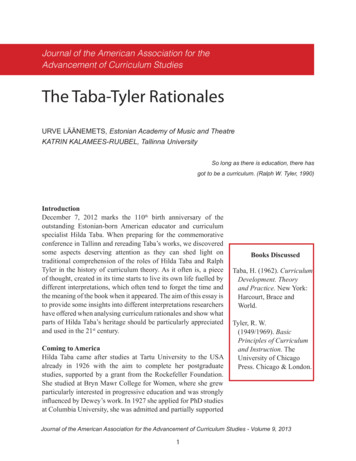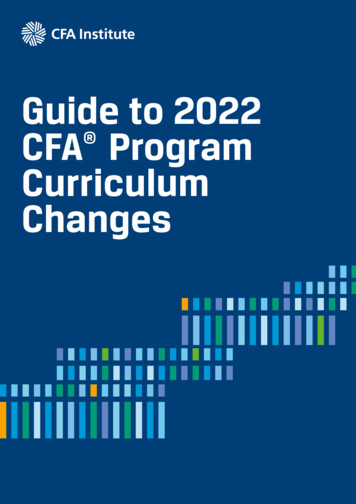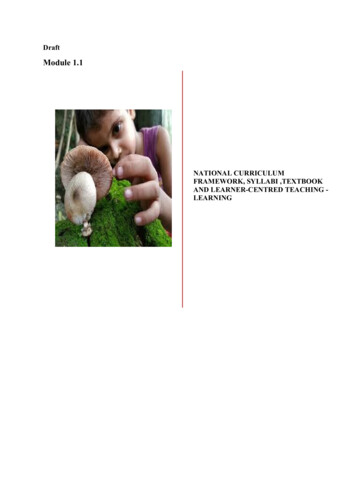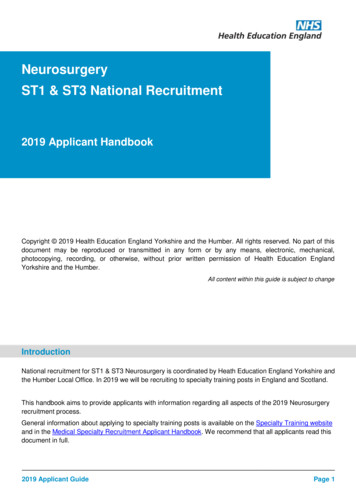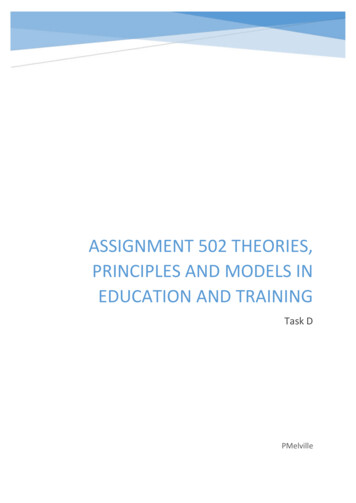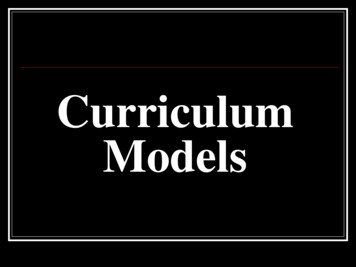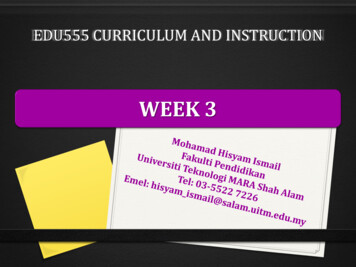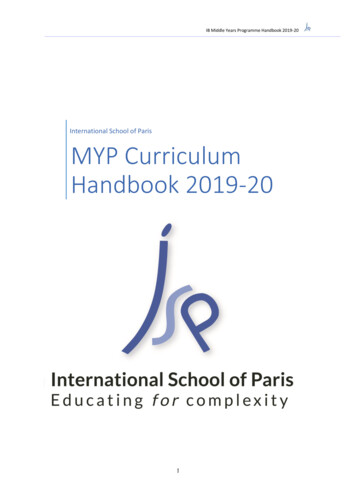
Transcription
IB Middle Years Programme Handbook 2019-20International School of ParisMYP CurriculumHandbook 2019-201
IB Middle Years Programme Handbook 2019-20ContentsInternational Baccalaureate Learner Profile . 4The IB Middle Years Program . 4The IB MYP Philosophy . 5The IB MYP is student-centered. . 5The philosophy’s key elements permeate and are practiced throughout the whole curriculum. . 5The IB Middle Years Program at ISP . 5The IB MYP Curriculum Model . 6A Concept-Driven Curriculum . 6Global Contexts . 7Approaches to Learning (ATL) . 8Service As Action . 10Language Learning at ISP . 10MYP Language Requirements at ISP . 10Language Placement. 10Students Study Three Languages at ISP. 11School Supported Mother Tongue (SSMT) Program . 11Additional French . 13Cultures et Sociétés Françaises . 13The International Baccalaureate at ISP: MYP and DP . 14MYP Subject Groups . 16Group 1: Language and Literature (English, French, Spanish, Japanese, Korean, Hindi, Malay or SSMT). 16Group 2: Language Acquisition (English, French, Spanish, Chinese) . 17Group 3: Individuals and Societies . 19Integrated Humanities. 19Group 4: Sciences . 20Integrated Science . 20Group 5: Mathematics. 21Extended Mathematics, Standard Mathematics . 21Group 6: The Arts . 23Drama, Media, Music, Visual Art . 23Group 7: Design . 24Integrated Design . 24Group 8: Physical and Health Education (also known as PHE) . 26Physical and Health Education . 262
IB Middle Years Programme Handbook 2019-20Homework . 27Tutors. 28IB MYP Assessment and Criteria. 28Awarding Grades . 29Summary of the Subject-Specific Assessment Criteria . 30IB MYP General Levels of Achievement. 30MYP Certificate and Promotion Requirements . 32IB Diploma Program Promotion . 32Promotion . 32Academic Honesty Policy. 32Academic Dishonesty . 32Prevention of Academic Dishonesty. 33Procedure for Investigating Suspected Cases of Academic Dishonesty . 33The Consequences of Academic Dishonesty . 33MYP Examinations – Grade 10 (MYP5). 34On-Screen Exam Regulations. 34Assessment FAQ . 35Information Directory . 373
IB Middle Years Programme Handbook 2019-20International Baccalaureate Learner ProfileThe IB learner profile represents ten attributes valued by IB World Schools. We believe these attributes,and others like them, can help individuals and groups become responsible members of local, nationaland global communities. (IB, ancedReflectiveDescriptionWe nurture our curiosity, developing skills for inquiry and research. Weknow how to learn independently and with others. We learn withenthusiasm and sustain our love of learning throughout life.We develop and use conceptual understanding, exploring knowledgeacross a range of disciplines. We engage with issues and ideas that havelocal and global significance.We use critical and creative thinking skills to analyse and take responsibleaction on complex problems. We exercise initiative in making reasoned,ethical decisions.We express ourselves confidently and creatively in more than onelanguage and in many ways. We collaborate effectively, listening carefullyto the perspectives of other individuals and groups.We act with integrity and honesty, with a strong sense of fairness andjustice, and with respect for the dignity and rights of people everywhere.We take responsibility for our actions and their consequences.We critically appreciate our own cultures and personal histories, as well asthe values and traditions of others. We seek and evaluate a range ofpoints of view, and we are willing to grow from the experience.We show empathy, compassion and respect. We have a commitment toservice, and we act to make a positive difference in the lives of others andin the world around us.We approach uncertainty with forethought and determination; we workindependently and cooperatively to explore new ideas and innovativestrategies. We are resourceful and resilient in the face of challenges andchange.We understand the importance of balancing different aspects of our lives— intellectual, physical, and emotional — to achieve wellbeing forourselves and others. We recognize our interdependence with otherpeople and with the world in which we live.We thoughtfully consider the world and our own ideas and experience.We work to understand our strengths and weaknesses in order to supportour learning and personal development.The IB Middle Years ProgramThe IB goal is to provide students with the values and opportunities that will enable them to developsound judgments, make wise choices and respect others in the global community. The IB MYP is apurpose-built five-year program (Grades 6-10, ages 11-16) for international schools which is taught andimplemented worldwide.The IB MYP builds upon the skills and learning developed in the IB Primary Years Programme (IB PYP). IBPYP teaching and learning “focuses on the development of the whole child as an inquirer, both in the4
IB Middle Years Programme Handbook 2019-20classroom and in the world outside” (IB). The IB MYP also relies on connecting classroom pedagogicalpractices and content to the world outside through the Global Contexts and the Learner Profile.The IB MYP prepares students for the IB Diploma Programme, which was established to providestudents with a balanced education, facilitate geographic and cultural mobility and to promoteinternational understanding.The IB MYP PhilosophyThe IB MYP emphasizes holistic learning.The IB MYP should expose students to as many different subjects, skills and experiences as possible sothat students will learn to see knowledge as an interrelated whole. Students should have theopportunity to show their various strengths while being rewarded for them and gaining a sense ofpersonal achievement.The IB MYP emphasizes intercultural awareness and communication.In our community, it is essential that the curriculum reflects and is responsive to the differentperspectives of all our students. It should also guide them in forming their own, international, outlook.This implies an emphasis on communication skills, both in the languages and in other subjects.The IB MYP is student-centered.It is vital that students develop an awareness of their own learning process and the necessary skills tocontinue learning throughout life. The curriculum seeks to shift the emphasis from teacher-ledinstruction to student-led learning wherever possible.The philosophy’s key elements permeate and are practiced throughout the whole curriculum.MYP educators have continued to focus on how best to meet the needs of adolescents, who areconfronted with a vast and often bewildering array of choices in a complex and rapidly changing world.A focus on higher-order thinking skills gives students opportunities to develop a growing awareness ofthemselves and others, as they explore real-world issues.The IB Middle Years Program at ISPThe International School of Paris adopted the IB MYP because the philosophy and objectives of thisprogram reflect those of the school. In addition, the IB MYP: is an international program with no bias towards any particular national system;provides vertical consistency through the IB Diploma in grades 11 and 12 and the PYP in thePrimary School; many elements of the IB MYP are common to the skills required by the Diplomaand developed in the PYP;provides assessment, within the IB MYP subjects, which share a common approach by beingcriterion-based and inquiry-led;has strong, interdisciplinary elements;is flexible enough to allow ISP to design the curriculum to fit student needs;does not prescribe content of subject areas but does provide a framework for their delivery;supports curriculum development and external evaluation.The assessment within each subject is designed to help students and parents recognize a student’sindividual strengths and weaknesses according to the particular set of skills necessary for achievement.5
IB Middle Years Programme Handbook 2019-20Please see the section on assessment or the ISP Assessment Policy, which is a separate document thatevery family will need.The IB MYP Curriculum ModelA Concept-Driven CurriculumA concept is a big idea—a principle that is enduring, the significance of which goes beyond aspects suchas particular origins, subject matter or place in time. Concepts represent the vehicle for students’ inquiryinto issues and ideas of personal, local and global significance, providing the means by which theessence of a subject can be explored.The MYP identifies prescribed key concepts and related concepts. These concepts ensure thedevelopment of a rigorous curriculum and promote a shared community of practice among IB WorldSchools offering the MYP.A concept-based model is used in the MYP because it encourages students to: process factual knowledge at a deeper intellectual level as they relate the facts to concepts andessential conceptual understandings;create personal relevance, as students relate new knowledge to prior knowledge, andencourage understanding of cultures and environments across global contexts through thetransfer of knowledge;bring their personal intellect to the study as they use a key concept to personally focus on theunit topic in order to increase motivation for learning;6
IB Middle Years Programme Handbook 2019-20 increase fluency as students use a common language to articulate their deeper conceptuallearning;achieve higher levels of critical, creative and conceptual thinking as students analyse complexglobal challenges through the study of discipline-specific related concepts.Global ContextsWhy are we learning this?Learning at ISP aims to help students understand the complex world.Clearly, there are many different things that one would need to understand in order to understand theworld. These things can be broken down in to six categories, known as the Global Contexts. Units ofwork in all subjects allow students to explore one of the Global Contexts.Global Contexts are designed to encourage the students to make worthwhile connections between thereal world and classroom learning. Through their learning of subject concepts, students will come to abetter understanding of a Global Context.When teachers select a global context for learning, they are answering the following questions. Why are we engaged in this inquiry?Why are these concepts important?Why is it important for me to understand?Why do people care about this topicThe six MYP Global Contexts (right) inspireexplorations of our common humanity andshared guardianship of the planet. They invitereflection on local, national and globalcommunities, as well as the real-life issues andconcerns of 11 to 16-year-old students. Over thecourse of their study, students will explore all sixGlobal Contexts on multiple occasions and indifferent subjects.The Global Contexts build on the powerfultransdisciplinary themes of the PYP, therebyextending and deepening understanding in anage-appropriate manner.7
IB Middle Years Programme Handbook 2019-20Primary Years Programme (PYP) K-G5Middle Years Programme (MYP) G6-10Transdisciplinary themes:Global contexts:Who we areIdentities and relationshipsWhere we are in place and timeOrientation in space and timeHow we express ourselvesPersonal and cultural expressionHow the world worksScientific and technical innovationHow we organize ourselvesGlobalization and sustainabilitySharing the planetFairness and developmentIn Grade 10 (MYP5), student inquiry into one, personally chosen Global Context is assessed through thePersonal Project. The Personal Project is a significant body of work produced over an extended period. Itis a product of student initiative and should reflect their experience of the MYP. More information canbe found in the ISP Personal Project Student Handbook, which will be made available to students andparents at the beginning of the 2019-20 school year.Approaches to Learning (ATL)It is widely known that the development of transdisciplinary skills are just as important in education aslearning in specific subjects.The transdisciplinary skills that empower students to be successful in school, education and beyond, areknown as Approaches to Learning (ATL).There are five broad categories of skills, which can be broken down into ten more specific categories ofATL skills. Through subject lessons, as well as the Advisory Programme, students will learn and practicedifferent strategies for developing these skills.8
IB Middle Years Programme Handbook 2019-20SkillAim: Students can -CommunicationWorking withpeopleExchange thoughts, messages and information effectivelythrough interacting with othersWorking withinformationUse written information to gather and understand informationand ideasUse writing to record and express their own information andideasSocialCollaborationWork effectively with other people in all situationsSelf-managementOrganizationManage their time and tasks effectivelyEmotions andfeelingsManage their own state of mindReflectionThink honestly about how they learn; choose, use and developtheir skillsInformationliteracyFind, interpret, judge and use information from many differentsourcesMedia* literacy(*masscommunication, includingsocial media)Find, interpret, judge and use information from different mediaCritical thinkingConsider different perspectives on issues and ideas (includingtheir own); make judgments based on different perspectives, andstrengths and weaknessesCreativethinkingGenerate novel ideas, think about things in a different way andconsider new perspectivesTransferunderstandingand skillsUse their skills and knowledge in new and different situationsResearchThinking9
IB Middle Years Programme Handbook 2019-20Service As ActionIn Grades 6-10 (MYP1-5), students participate in service-based activities where the students have totake action. Activities vary by grade. In lower grades, students work in homeroom groups to complete aService as Action (SA) project. They will also be given opportunities to take part in other school-basedprojects, on a voluntary basis. In upper grades, students must take part in at least two different SAprojects and at least one must involve working as part of a team. It is recommended that students useand build upon their own interest and experiences to come up with projects. The SA Coordinatorpublishes and promotes various SA activities, exchanges, and trips throughout the year. These areadvertised in student assemblies and within the wider community. Students must keep a journal orportfolio of evidence of their SA activities and record their projects and reflections in the school’scurriculum management tool ManageBac.Grade 9 and 10 (MYP4 and 5) students have a Service as Action interview in mid-June to check on theirprogress and verify their commitment to the program.During the interviews, the students’ reflections and conversation will be used to show evidence of theSA outcomes listed below: become more aware of their own strengths and areas for growth;undertake challenges that develop new skills;discuss, evaluate and plan student-initiated activities;persevere in action;work collaboratively with others;develop international-mindedness through global engagement, multilingualism and interculturalunderstanding;consider the ethical implications of their actions.Service as Action is a requirement for IB MYP in every year of the program. Progression from year toyear and the awarding of the MYP certificate at the end of Grade 10 (MYP5) is dependent on studentsmeeting the school’s expectations for Service as Action.Language Learning at ISPLanguage learning is at the heart of building a sense of self, identity and community. ISP has a stronglanguage learning focus which is reflected in our curriculum.The IB offers two different language programs: “Language and Literature” and “Language Acquisition”.The first is designed to support native (or mother tongue) speakers and is based on the study ofliterature; the second is designed for students who are still learning the language and is aimed atimproving language usage.MYP Language Requirements at ISPStudents are required to study three language courses, at least one of which must be a Language andLiterature course by Grade 9 and 10.Students who are in danger of not meeting this requirement are notified at reporting time.Language PlacementThe Heads of Department for the languages (English, French and World Languages) work with the MYPteachers to assign students to classes based on their current level of proficiency. New students will havea diagnostic test at the start of the year to form a base line.10
IB Middle Years Programme Handbook 2019-20Moving Into the Next Phase or CourseLevels of proficiency are categorized according to the IB’s “Continuum” of language learning. Studentsprogress through “phases” as their language proficiency levels increase, from Phase 1 (Beginner) toPhase 6 (Proficient).Student movement from one phase to the next, or one course to the next, is only possible at reportingtimes. Teachers will decide in consultation with the Head of Department if a change is appropriate andbeneficial for a student.As soon as a student joins a Language and Literature class and demonstrates success at this level over anextended period of time, they will no longer be able to return to a Language Acquisition class for thatlanguage.Students exiting the MYP after Grade 10 (MYP5) in a Language and Literature class, and havingdemonstrated success at this level, will not have access to IB DP (Grade 11) Language B classes.MYP Language and Literature students are expected to enrol in an IB DP Language A class.Students Study Three Languages at ISPIn Grades 6-10 (MYP1-5), all students must study the following two languages: English: the language of instruction French: the language of our host countryIn addition, all students must choose one language program from the following options:Option 1: One Language & Literature course offered by the school Hindi, Japanese, Korean, Spanish, MalayOption 2: One Language Acquisition program offered by the school Spanish, ChineseOption 3: One Language & Literature course in the School-Supported Mother Tongue(SSMT) program Students may choose to study their own language, supported by a tutor. The schoolstrongly encourages the study of mother tongue languages and will assist families infinding a tutor.Option 4: One French language enrichment program offered by the school Additional French or Cultures et Sociétés FrançaisesSchool Supported Mother Tongue (SSMT) ProgramISP is an English medium school, but our students speak over thirty-five different languages. ISP’sstudents come with diverse and multi-layered language profiles and backgrounds. Obviously, it is notpossible to offer classes in all these languages.In addition to the taught languages that the school offers, ISP also provides the option of studying anymother tongue as part of the School-Supported Mother Tongue program (SSMT).Curriculum and MYP CertificationSSMT students follow a school-set curriculum with the help of a private tutor in their individual mothertongue. ISP will help to find a tutor and guide the student through the program, while parents arefinancially responsible for the tutor’s fees.11
IB Middle Years Programme Handbook 2019-20The curricular program is MYP-aligned and, if the student meets the requirements and can present acompleted Learner Portfolio at the end of each Grades 9 and 10, will lead to successful MYPCertification.The school will provide official transcripts for these grades as long as the student has been studyingunder the supervision of a tutor.Tutors can support the student face-to-face in school during SSMT lessons, face-to-face at home outsideof school hours or even long-distance via video call.Online language learning programs without a real person are not sufficient for SSMT and will not lead toa transcript or successful MYP Certification.Why Choose SSMT?SSMT is interesting for students who: wish to continue, reconnect, maintain or deepen their study of their mother tongue;might not be proficient enough to study either English or French at Language and Literaturelevel AND are not mother tongue speakers of Japanese, Korean, Spanish, Malay or Hindi; need to maintain or provide proof of proficiency of their mother tongue for further nationalschooling.SSMT transitions into the “School-Supported Self-Taught” Program at Diploma level, where students cancontinue studying their mother tongue as part of the IB Diploma Program and count it as their onerequired Language A.On average, more than 10% of ISP students choose the SSMT option, covering more than ten languagesin addition to the officially taught options.SSMT SetupIf you choose SSMT, it is important to understand that this is not delivered in the same manner as theother language classes (for example, English, French or Spanish) taught at ISP. Please read the followinginformation carefully.When the school receives a request for a SSMT course, the Head of Department for World Languageswill manage the following process: the student commits to following the school-set curriculum including all required assignmentscontained in the Learner Portfolio; the school will support parents in identifying a tutor to support the student’s learning; lessons will be scheduled during the regular school day and all books and resources will beprovided or paid for by the school; the parent(s) will commit to paying the tutor for their services. The Head of Department forWorld Languages will put families with common language goals in contact with each other, sothat costs can be shared. This is private arrangement between the tutor and the families forwhich the school has no responsibility; the Head of Department for World Languages will collect assignments from students andassessment and reporting data from tutors at reporting times to generate a transcript for thestudent.12
IB Middle Years Programme Handbook 2019-20School-supported mother tongue classesEach year, there may be mother tongue language classes that are sufficiently popular for the school toconsider contracting a tutor (“auto entrepreneur”) for the academic year. The school will consider amaximum of two additional school-supported mother-tongue language classes each academic year.The decision to meet the costs of a mother tongue class is always at the discretion of the head of schooland is based on the following: the class needs to be sustainable, by which we mean it is of sufficient size and that the familiesare committed to ISP for the academic year;the school must be able to source a tutor who has appropriate teaching credentials andprofessional references, and who has successfully passed a police background check;priority will be given to languages that provide continuity of learning in the school;the decision regarding school-supported mother tongue classes will be made on September 30and will be reviewed on January 30 to account for new enrolment and school leavers.Additional FrenchInitiation/ImmersionStudents may choose to take a second French language program, which is primarily for students whowould like more French language tuition. This is offered in Grades 6-10 (MYP1-5) and is suited tobeginners and intermediate speakers. Its objectives are to encourage the spontaneous use of the Frenchlanguage and to reinforce the students’ motivation to learn French.Specifically, the course goals are to develop communication skills for daily life, improve oral confidencein the language and facilitate a deeper appreciation of living in Paris.This course will focus on oral skills through a series of short topics/themes connected to life in Paris andmade up of: role-playing: rehearsing/acting/filming/reviewing/using the language in real life;games and songs;oral presentations;"treasure hunt" explorations of areas in central Paris;visits to museums and monuments.Cultures et Sociétés FrançaisesThis course is offered in Grades 6-10 (MYP1-5) and is taught in French. It is offered as an alternative to athird language and is not a language course but an Individuals and Societies program
purpose-built five-year program (Grades 6-10, ages 11-16) for international schools which is taught and implemented worldwide. The IB MYP builds upon the skills and learn
